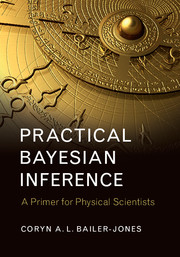Akaike, H., 1973, Information theory and an extension of the maximum likelihood principle, in Petrov, B.N. & Csáki, F., Second International Symposium on Information Theory, Tsahkadsor, Armenia, USSR, 1971, Budapest: Akadémiai Kiadó, pp. 267–281
Akaike, H., 1974, A new look at the statistical model identification, IEEE Transactions on Automatic Control
19, 716–723
Bailer-Jones, C.A.L., 2012, A Bayesian method for the analysis of deterministic and stochastic time series, Astronomy & Astrophysics
546, A89
Bailer-Jones, C.A.L., 2015, Estimating distances from parallaxes, Publications of the Astronomical Society of the Pacific
127, 994–1009
Cox, R.T., 1946, Probability, frequency and reasonable expectation, American Journal of Physics
14, 1–13
Deming, W.E., 1943, Statistical Adjustment of Data, Wiley
Foreman-Mackey, D., Hogg, D.W., Lang, D., Goodman, J., 2013, emcee: The MCMC Hammer, Publications of the Astronomical Society of the Pacific
125, 306–312
Friel, N., Pettitt, A.N., 2008, Marginal Likelihood estimation via power posteriors, Journal of the Royal Statistical Society B
70, 589
Gelman, A., Rubin, D.B., 1992, Inference from iterative simulation using multiple sequences, Statistical Science
7, 457–511
Gigerenzer, G., 2002, Reckoning with Risk, Penguin
Goodman, J., Weare, J., 2010, Ensemble samplers with affine invariance, Communications in Applied Mathematics and Computational Science
5, 65
Gregory, P., 2005, Bayesian Logical Data Analysis for the Physical Sciences, Cambridge University Press
Jaynes, E.T.
1973, The well-posed problem, Foundations of Physics
3, 477–493
Jeffreys, H., 1961, Theory of Probability, Cambridge University Press, 3rd edition
Kass, R., Raftery, A., 1995, Bayes factors, Journal of the American Statistical Association
90, 773
Kass, R.E., Wasserman, L., 1996, The selection of prior distributions by formal rules, Journal of the American Statistical Association
91, 1343–1369
Kass, R.E., Carlin, B.P., Gelman, A., Neal, R.M, 1998, Markov Chain Monte Carlo in practice: A roundtable discussion, The American Statistician
52, 93–100
Kolmogorov, A.N., 1933, Grundbegriffe der Wahrscheinlichkeitsrechnung, 1933, Springer (English translation: Foundations of the Theory of Probability, 2013, Martino Fine Books)
Kruschke, J.K., 2015, Doing Bayesian Data Analysis, Elsevier, 2nd edition
Lartillot, N., Philippe, H., 2006, Computing Bayes factors using thermodynamic integration, Systematic Biology
55, 195
MacKay, D.J.C., 2003, Information Theory, Inference and Learning Algorithms, Cambridge University Press
McElreath, R., 2016, Statistical Rethinking: a Bayesian Course with Examples in R and Stan, CRC Press
Newton, M.A., Raftery, A.E., 1994, Approximate Bayesian inference with the weighted likelihood bootstrap, Journal of the Royal Statistical Society B
56, 3–48
Robert, C.P., Chopin, N., Rousseau, J., 2009, Harold Jeffreys's Theory of Probability revisited, Statistical Science
24, 141–172
Schwarz, G., 1978, Estimating the dimension of a model, The Annals of Statistics
6, 461– 464
Sivia, D.S., Skilling, J., 2006, Data Analysis: a Bayesian Tutorial, Oxford University Press, 2nd edition
Skilling, J., 2004, in Fisches, R., Preuss, R., von Toussaint, U. (eds), AIP Conf. Proc. Vol. 735, Bayesian Inference and Maximum Entropy Methods in Science and Engineering, p. 395
Trotta, R., 2007, Applications of Bayesian model selection to cosmological parameters, Monthly Notices of the Royal Astronomical Society
378, 72
Venables, W.N., Ripley, B.D., 2002, Modern Applied Statistics with S, Springer, 4th edition
Wald, A., 1943, A method of estimating plane vulnerability based on damage of survivors, Statistical Research Group, Columbia University, CRC 432





